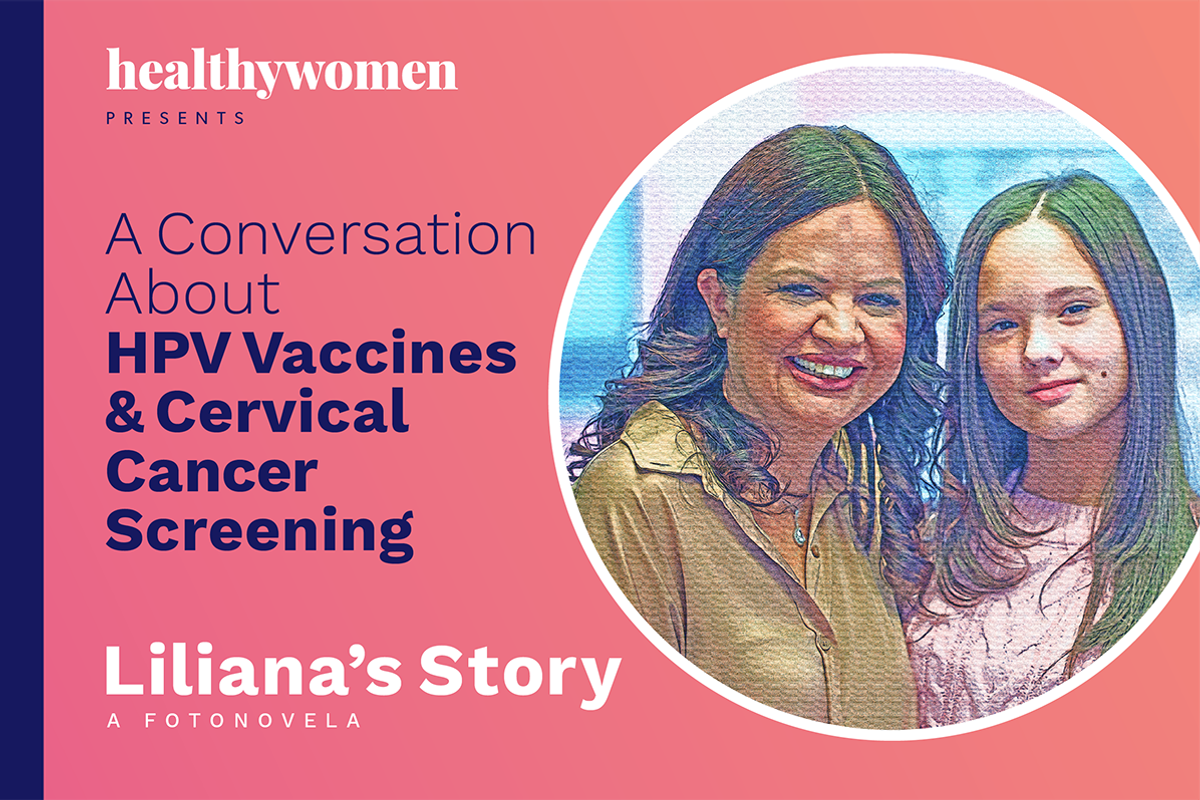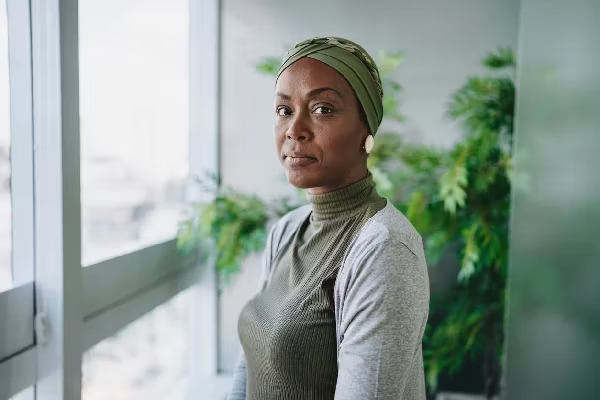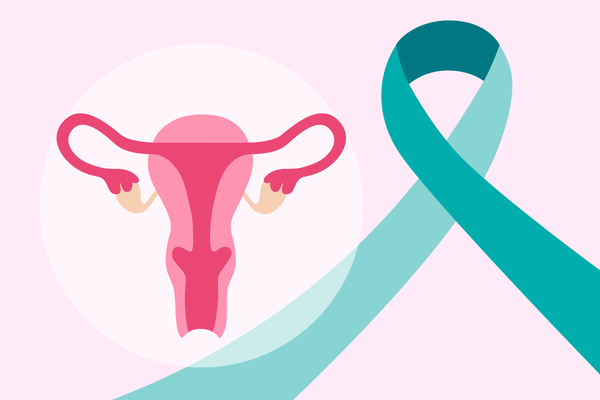Designed by Elizabeth Gething
Having candid conversations with your healthcare provider shouldn't be uncomfortable. See how Liliana did it in "A Conversation About HPV& Cervical Cancer Screening."
Tip: Click the three vertical dots to view in full-screen.
HCP’s office. Liliana (40-45 yr old woman, darker skin) is sitting on a patient table (don't know what they are called, Maricela is on chair, HCP is talking close to Liliana). Liliana is accompanied by her 12-year-old daughter, Maricela. (It is common for Latina patients to be accompanied by their children in case they need help with translation) | Dr. Sharp: Hello Ms. Arias, how are you today? |
Lilian and Marciela are looking at Doctor Sharp; Dr sharp is leafing through papers on a clipboard, looking down. | Dr. Sharp: I was looking at your chart, and I see here that the last time you had your Papanicolaou, or Pap, was five years ago. Do you know if you also got your HPV test? |
Thought bubble: What is an HPV test? Isn't it the same as the Papanicolaou? Liliana (looking confused and nodding slowly). Mmmm, Yes? | |
Dr. Sharp: Well, just in case Liliana, let me explain what HPV is and why testing for it is important. | |
Dr. Sharp, grabs a plastic model of a woman’s reproductive system | Dr. Sharp: HPV is short for human papillomavirus. It’s the most common sexually transmitted infection. HPV can go away by itself, but sometimes, certain types can lead to cancer or genital warts. |
Liliana looks perplexed, a little embarrassed, and stays silent. | Liliana: *nods* Thought bubble: Hmm … no way I have that. I’ve only slept with my husband. |
Dr. Sharp: Now, this doesn’t mean someone who has HPV has slept with a lot of people. Most people who’ve had sex get HPV at some point. There’s no need to be embarrassed or ashamed about it. But, I wanted to bring it up because HPV can lead to cancers — especially cervical cancer. That’s why screening is so important — so we can prevent cancer. | |
Liliana: Oj, I understand. How can I get checked for HPV? | |
Dr. Sharp: We can do it today when we do your Pap. If you’re positive for HPV, we may need to do follow-up testing. Remember that having HPV doesn’t mean you definitely will develop cervical cancer. It might just mean you have the virus and have some changes in your cells. If it’s a negative test, this means that Paps can be done less often. | |
Liliana looks a little nervous and resistant | Liliana: *nods* |
Dr. Sharp: How are you feeling right now with the information I’ve provided so far? | |
Liliana: A little nervous. | |
Dr. Sharp: I understand this may feel a little scary, but there’s no need to worry. We’re going to test to make sure everything is ok. | |
Liliana: Ok … will the test hurt? | |
Dr. Sharp: No, it won’t be painful but it may be a little uncomfortable. It’s the same procedure as the Pap. I’ll get a sample of cells from your cervix using a soft brush and we’ll run both tests from that sample. | |
Dr. Sharp: Now, have you ever received the HPV vaccine? | |
Liliana: No. I’ve never gotten that vaccine before, so I don’t think I need it now. | |
Dr. Sharp: I can understand why you’d feel like that. A few years ago, the HPV vaccine wasn’t available for everyone. But, now it is and it’s a great tool to prevent cervical cancer. On a scale of 1-10, how important is it to you to prevent cancer? | |
Liliana: I would say a 10. | |
Dr. Sharp: That’s wonderful! The HPV vaccine is most effective if given at younger ages and before teens are sexually active. But it is still a great idea for you to get it today. | |
Dr. Sharp: I’m so happy we’re focusing on taking care of you, Ms. Arias, which means you’ll also be taking care of your family. I was wondering what your thoughts are about also vaccinating your daughter? | |
Liliana: I think I’d prefer to talk to my husband about it before I make that decision. | |
Thought bubble: How will I bring this conversation up to my husband? Dr. Sharp: I understand. If it’s helpful, you can let him know that this is a very safe and effective cancer prevention vaccine. This wasn’t available when we were kids. But now we know that 11 or 12 is the best age to vaccinate boys and girls, before they’re likely to be sexually active. Also, we’re available to answer any questions he may have. | |
Liliana: Ok, thank you. If we decide to get Maricela the vaccine, where can we get it done? | |
Dr. Sharp: You can bring her here or to her pediatrician. Do you have any other questions for me before we do the Pap and HPV test? | |
Liliana: If I don't need to get a Pap next year, should I still come see you? | |
Dr. Sharp: Great question! Yes, I still want to see you next year to discuss general health concerns or do other screenings. Please ask the front desk to make an appointment for you as you leave. | |
Liliana: Sounds good. Thank you! | |
You’re welcome. I’ll keep you updated on your Pap and HPV results, and I’ll see you next year! | |
| |
A very special thank you to: Patricia Geraghty, MSN, FNPBC, WHNP Cathy Maslen and Absolute Care of Baltimore | |
This resource was created with support from Merck. | |
- Fast Facts: Here’s What You Need to Know About Cervical Cancer and HPV ›
- HPV, Cervical Cancer and Cervical Cancer Screening: What Do You Need to Know? ›
- Cervical Cancer Screening Can Save Your Life ›
- Benefits of the HPV Vaccination: Cancer Prevention - HealthyWomen ›
- Ask the Expert: HPV and Cervical Cancer - HealthyWomen ›
- Difference Between a Pap Test and an HPV Test - HealthyWomen ›
- Facts About HPV - HealthyWomen ›
- American Cancer Society Cervical Cancer Screening Guidelines - HealthyWomen ›
- Barriers to Cervical Cancer Screening for the LGBTQ - HealthyWomen ›
- Take Steps Toward Preventing Cervical Cancer - HealthyWomen ›
- How often should I be screened for cervical cancer? - HealthyWomen ›
- Facts About Cervical Cancer Quiz - HealthyWomen ›




